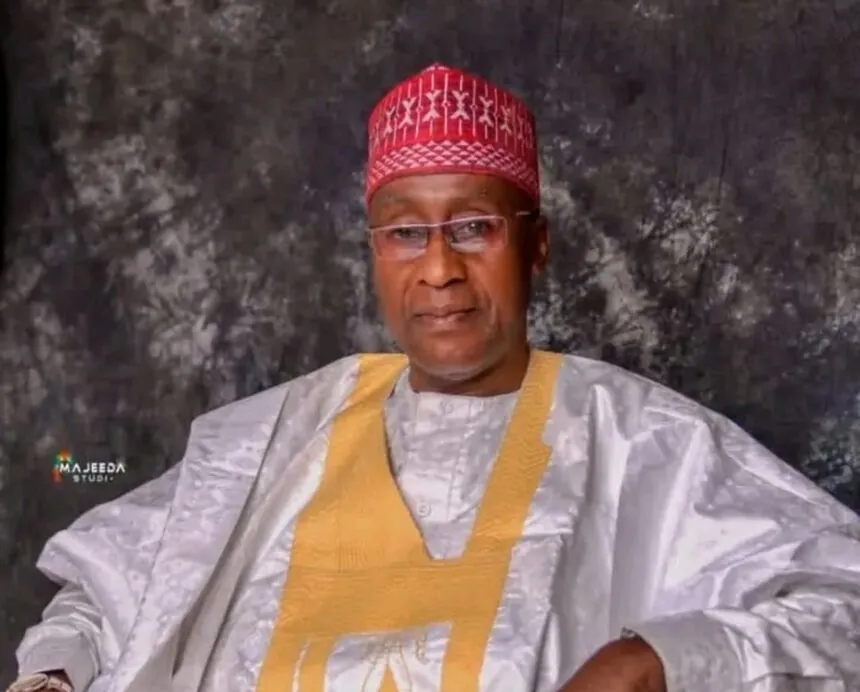News
Epileptic Power Supply: Lekki Residents Protest, Call For EKEDC Removal

Residents of Lekki Phase 1 in Eti Osa Local Government Area of Lagos State, have expressed frustration over the epileptic power supply being witnessed in the area.
Speaking with journalists earlier today, residents stated that this has been their plight for over five years. They noted that the situation worsened since the beginning of the year, attributing it to lack of investment by the Eko Electricity Distribution Company (EKEDC).
One of the residents, Chief Theodore Oniopaku bemoaned the situation, citing instances where they barely get thirty minutes of electricity per day and sometimes endure up to eighteen days without power in a month.
He said, “The situation is really bad. We’ve been trying to avoid protests because we don’t want a situation where hoodlums will hijack it like what happened during the End SARS protest.
“But it seems no one is paying attention to our plight. Some of us are retirees, we live on pensions. How can we afford a litre of diesel at N1,600 per litre? How much do we earn in a month?”
READ ALSO: Court Dismisses Suit Seeking To Stop Elections, Examinations On Saturday
A retired Justice, Eniola Oluokun reiterated these sentiments, noting a six-year struggle with poor power supply in the area.
Oluokun called for independent power supply solutions for the area, criticizing EKEDC’s lack of financial capacity and technical expertise to address the issue effectively.
He said, “Lekki phase 1 residents should be on an Independent Power supply. It is Nigeria’s heartbeat and destination for holiday fun seekers. Most visitors and tourists prefer to stay in Lekki Phase 1.
“Unfortunately, I don’t think EKEDC has the financial capacity and technical expertise to provide electricity in the area.
“Some of their equipments are old and obsolete. Whenever their equipment is faulty, it takes them five to six days to fix leaving the estate without light. Our neighbours in Banana Island who use the Independent Power plant have constant light, but we don’t. It’s a very painful situation.”
READ ALSO: Electricity Subsidy No Longer Sustainable – FG
Another resident, a retired civil servant who preferred anonymity, blamed past governments, for the collapse of the power generation in Nigeria.
He cited corruption and lack of transparency during the power privatization process as contributing factors.
“The corruption in the power sector where trillions of Naira were diverted to private accounts and lack of transparency during the power privatisation contributed immensely to the collapse of our power generation. If the government refuse to address these two monsters, Nigerians must not expect power soon”. He said.
Recall that the residents’ frustration have once led to a legal action against EKEDC, due to failed promises and billing discrepancies.
In April 2022, Lekki residents petitioned the presidency, represented by Ambassador Ibrahim Gambari MFR, seeking intervention to compel EKEDC to provide adequate power supply comparable to other affluent areas like Victoria Island, Ikoyi, and Banana Island.
READ ALSO: NDLEA Seizes 44,948kg Drugs, Vehicles In Lagos, Edo, Ondo Raids
At the time, Mogaji Wale Arisekola a resident and media consultant for the estate, expressed grievances over high-end user tariff plans.
He estimated potential damages of N10 billion to N15 billion from EKEDC’s shortcomings and also urged affected estates to seek legal recourse.
Arisekola said, “It is a case of accepting money under false pretext, which is in section 419 in the Nigeria penal code. The whole of Lekki Phase 1 estate no longer wants to have anything to do with EKEDC again. They are tired of paying for darkness. The tariff they put us on is for a minimum of eighteen hours in a day and we are getting less than six hours. We have enough grounds to approach the court of law to demand our fundamental rights.
“We are looking at a damage of N10 billion to N15 billion from EKEDC and the court order barring EKEDC from disturbing the Independent Power supply engaged by the estate. EKEDC’s excuses are no longer acceptable to us in the estate.”
However, despite previous attempts by EKEDC to address customer complaints, including the inauguration of a Customers’ Complaint Unit in Lekki, residents remain dissatisfied with the quality of service.
Meanwhile, residents are set to embark on a peaceful protest against the injustice by EKEDC on Saturday 30th of March 2024 at the Lekki Phase 1 Gate.
This was made known through the “notice of protest” being circulated on WhatsApp and Zonal groups, which reads in part “…We are tired of sleeping in darkness. Please all Lekki residents must endeavour to participate. We have been sleeping without power for about a month now…”
News
MOWAA: Okpehbolo Receives Edo Assembly Resolution Indicting Obaseki

Edo State Governor, Monday Okpebholo, received report and resolutions of the Edo State House of Assembly which indicted former Governor Godwin Obaseki on the Museum of West African Art (MOWAA) and the Radisson Hotel projects.
Recall that the Edo Assembly raised a five-man committee to investigate funding and ownership of both projects following a request by Governor Okpebholo.
Okpebholo, who spoke after receiving the report said its findings and recommendations would be fully implemented.
Okpebholo said the Economic and Financial Crimes Commission (EFCC) would be invited to further examine issues raised in the recommendations.
READ ALSO:MOWAA: Why I Will Not Appear Before Edo Assembly Panel — Obaseki
According to him, the Edo State Government has significant stakes in the MOWAA and Radisson Blu hotel having invested ₦3.8bn respectively in both projects.
He said changes in the structure and nomenclature of the MOWAA project made the investigation unavoidable.
Okpebholo said it was unacceptable to suggest Edo State has only 10 per cent stake in the Radisson Blu hotem despite investing over ₦28bn.
“Edo State has spent over ₦3.8 billion on this project, yet some people are saying the state has no stake in it. That is totally unacceptable. I will work with your recommendations and forward them to the relevant authorities to investigate what truly happened. We will also involve the EFCC.
READ ALSO:MOWAA Controversy: Edo Assembly Threatens Arrest Warrant On Obaseki, Others
“Our investment in this project is over ₦28 billion. We must invite the EFCC to step in and determine if this is how businesses are conducted in Nigeria,” he said.
In its recommendations passed by the Assembly, the five-man committee headed by Hon Addeh Isibor, urged the Edo State Government to take possession of both projects.
It asked Governor Okpebholo to contract competent hands to complete renovation of the Hotel and take all steps to put the Hotel to use.
The recommendations urged the Edo State Government to revoke “the fraudulent Certificate of Occupancy to the property issued in the name of Hospitality Investment and Management Company Limited and revert same to the Edo State Government that purchased the property.
READ ALSO:Edo Assembly Charges Contractor Handling Ekekhuan Road To Accelerate Work
“That the Edo State Government initiate legal action and work with relevant Anti-graft Agencies to retrieve both the complete statement of account and the balance of the Seventeen Billion, Five Hundred Million Naira (N17,500,000,000.00) Bond proceeds still in the possession of the Escrow Agents. Meristen Trustees Limited and Emerging Africa Trustees Limited.
“The title to the MOWAA Property having never been revoked, same remains the property of the Central Hospital, Benin City
“That the Edo State Government immediately takes all necessary step to put the property to good use in the best and overriding public interest of the people of Edo State.”
Speaker of the Assembly, Hon. Blessing Agbebaku, said the facts about MOWAA and Radisson Blu Hotel were now clearly documented in resolutions and outcomes.
News
Sheikh Gummi Sues Two Over Alleged False Facebook Publication

Prominent Islamic scholar, Sheikh Ahmad Gummi, has approached the Chief Magistrate Court in Kaduna, seeking the issuance of a criminal direct complainant summons against two Facebook users over alleged criminal conspiracy, attempt to cause public disturbance and criminal defamation.
The application, filed at the Chief Magistrate Court sitting on Ibrahim Taiwo Road, Kaduna, listed the defendants as George Udom and Bello Isiaka.
According to him, the defendants allegedly published a “Breaking News” statement on their respective Facebook pages on December 23, 2025, between 7:00 am and 10:00 am, attributed to him, threatening that the family of the Minister of Defence, General Christopher Musa, would be eliminated if military operations against bandits were not stopped.
Gummi alleged that the publication was falsely attributed to him, as his photograph was allegedly used alongside the statement, giving the impression that he issued the threat against the Defence Minister.
READ ALSO:Nigeria Army Alone Cannot Defeat Bandits — Sheikh Gumi
The Islamic scholar stated that following the publication, he received numerous phone calls from concerned members of the public who believed he authored the statement and was attempting to intimidate the Minister of Defence in the discharge of his official duties.
He further maintained that the publication portrayed him as a troublemaker and a threat to public peace, despite his long-standing reputation as a cleric known for preaching peace and harmony within and outside Nigeria.
The complainant argued that the alleged publication was capable of inciting public disorder in Kaduna State, particularly Southern Kaduna, and could expose him to danger by presenting him as a prime suspect in the event of any attack on the Defence Minister’s family.
READ ALSO:Insecurity: What Sheikh Gumi Told Me After Visiting Bandits Hideouts — Obasanjo
He also contended that the actions of the defendants amounted to an attempt to cause public disturbance and criminal defamation of his character.
Dr Gummi told the court that the alleged acts contravened Sections 59, 57, 372, 116 and 117 of the Kaduna State Penal Code Law, 2017.
The application, dated December 24, 2025, was filed by a team of lawyers led by Suleiman Danlami Lere, with the complainant urging the court to summon the defendants to answer to the allegations.
News
JUST IN: Kano Lawmaker, Sarki Aliyu Daneji, Dies Hours After Colleague’s Passing

Hon. Sarki Aliyu Daneji, the lawmaker representing Kano Municipal in the Kano State House of Assembly, died on Wednesday, barely hours after the death of his colleague, Hon. Aminu Sa’adu Ungogo.
The Director-General, Media and Public Relations, Government House, Kano, Sanusi Bature Dawakin Tofa, confirmed Daneji’s death to journalists in Kano.
Daneji’s demise came shortly after the passing of Hon. Ungogo, who was the Chairman of the House Committee on Appropriations and represented Ungogo Local Government in the Assembly. Ungogo, a member of the New Nigeria Peoples Party (NNPP), reportedly died after a brief illness.
READ ALSO:JUST IN: Former Edo Information Commissioner Is Dead
He was said to have been at the Kano State House of Assembly earlier in the day, attending a committee meeting before his death.
The sudden loss of the two lawmakers within a short interval has thrown the Kano State House of Assembly into mourning, with colleagues, party members and constituents expressing shock and grief over the tragic development.

 News2 days ago
News2 days agoPHOTOS: New Era In Furupagha-Ebijaw As Okpururu 1 Receives Staff Of Office

 Metro4 days ago
Metro4 days agoJUST IN: Former Edo Information Commissioner Is Dead

 News1 day ago
News1 day agoUBTH CMD Marks 120 Days In Office, Expresses Commitment To Providing Conducive Working Environment

 News2 days ago
News2 days agoFG Declares Public Holidays For Christmas, New Year Celebrations

 News4 days ago
News4 days agoCoordinator, Edo First Lady Office, Majority Leader, Rights Lawyer, Others Bag 2025 Leadership Award

 Metro4 days ago
Metro4 days agoShe Grabs, Pulls My Manhood Anytime We Fight — Husband

 News5 days ago
News5 days ago[OPINION] Tinubu: Ade Ori Okin Befits KWAM 1, Not Awujale Crown

 News2 days ago
News2 days agoOPINION: Gumi And His Terrorists

 News1 day ago
News1 day agoFIRS Confirms NIN As Tax ID

 Metro4 days ago
Metro4 days agoWhy I Charged My Husband Money For Sex —Woman




























